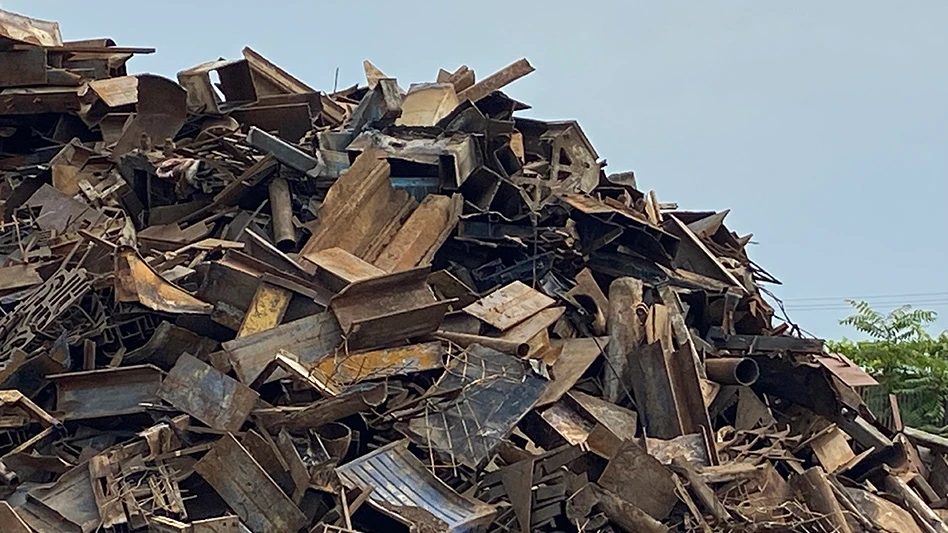
Recycling Today archives
Steel mill transaction figures for ferrous scrap purchases from June 20 to July 19 show a market that refuses to bounce back after several months in a trough.
The mill transaction averages, collected by the Raw Material Data Aggregation Service (RMDAS) business unit of Pittsburgh-based MSA Inc., display relative price stability compared with the prior 30-day period.
That is not especially good news for scrap generators, since three benchmark grades tracked by RMDAS across three U.S. regions all are being purchased for less than $400 per ton on average.
While prices are uniformly down compared with the start of this year, there are some regional differences in the U.S. market.
In the South, where the RMDAS prompt industrial composite price had been holding up a little higher than in the other two regions, the grade dropped by $17 per ton in late June and into July, meaning it is trading between $6 to $14 per ton lower in the South than in the RMDAS North Central/East or North Midwest regions.
Another noticeable difference is regional pricing for the No. 1 heavy melting steel (HMS) grade. In the most recent trading period, No.1 HMS was purchased for an average of $303 per ton in the inland North Midwest, compared with $322 in the North Midwest and $339 in the South, where export options are more accessible.
Reports from Davis Index this summer portray overseas buyers as rarely willing to bid up prices this spring or summer. However, just the existence of the option seems to have added at least a little value to HMS grades near port cities.
Globally, steelmaking in the two largest U.S. ferrous scrap export markets would portray what should be a flourishing market for outbound scrap. According to first-half 2024 figures from the Brussels-based World Steel Association (Worldsteel), Turkey produced 16.9 percent more steel in the first half of this year compared with the same time frame in 2023, while India’s output increased by 7.4 percent.
However, reports indicate steel producers there may be relying more heavily on slabs and billet imported from nations including China and Russia rather than filling their furnaces with U.S. scrap. China is making more steel than it can absorb while sanctioned Russian steel is being shipped at a discount to producers willing to buy it.
In the first two months of this year, according to data collected by the U.S. Census Bureau and collated by the U.S. Geological Survey, slightly less than 1.96 million metric tons of ferrous scrap was exported, reflecting a 14.5 percent drop in export levels year on year.
While Turkey’s steel output has increased by a double-digit amount, its purchase of U.S. scrap in the first two months rose by just 6 percent, from about 608,000 metric tons in the first two months of last year to 645,000 metric tons in 2024.
India, while making more steel, actually purchased less U.S. scrap early this year compared with the first two months of 2023. While some 216,000 metric tons of scrap was shipped from the U.S. to India in January and February of last year, the 142,000 metric tons shipped in the first two months of this year represents a 34 percent drop.
On the domestic steelmaking front, the Washington-based American Iron and Steel Institute reports year-to-date steel output in the U.S. through July 20 (about 49 million tons) is down by 2.3 percent compared with 2023.
Mills in the U.S. through the third week of July have been operating at an average capability utilization (capacity) rate of 76.5 percent, down from a 77.3 percent capacity rate in the first seven months of last year.
Offering better news, in the week ending July 20, output of nearly 1.74 million tons was up by 3.0 percent compared with the nearly 1.69 million tons made in the comparable week in 2023.
Output in the most recently completed week also was up 0.2 percent compared with the previous week, according to AISI.
Latest from Recycling Today
- Aqua Metals secures $1.5M loan, reports operational strides
- AF&PA urges veto of NY bill
- Aluminum Association includes recycling among 2025 policy priorities
- AISI applauds waterways spending bill
- Lux Research questions hydrogen’s transportation role
- Sonoco selling thermoformed, flexible packaging business to Toppan for $1.8B
- ReMA offers Superfund informational reports
- Hyster-Yale commits to US production





